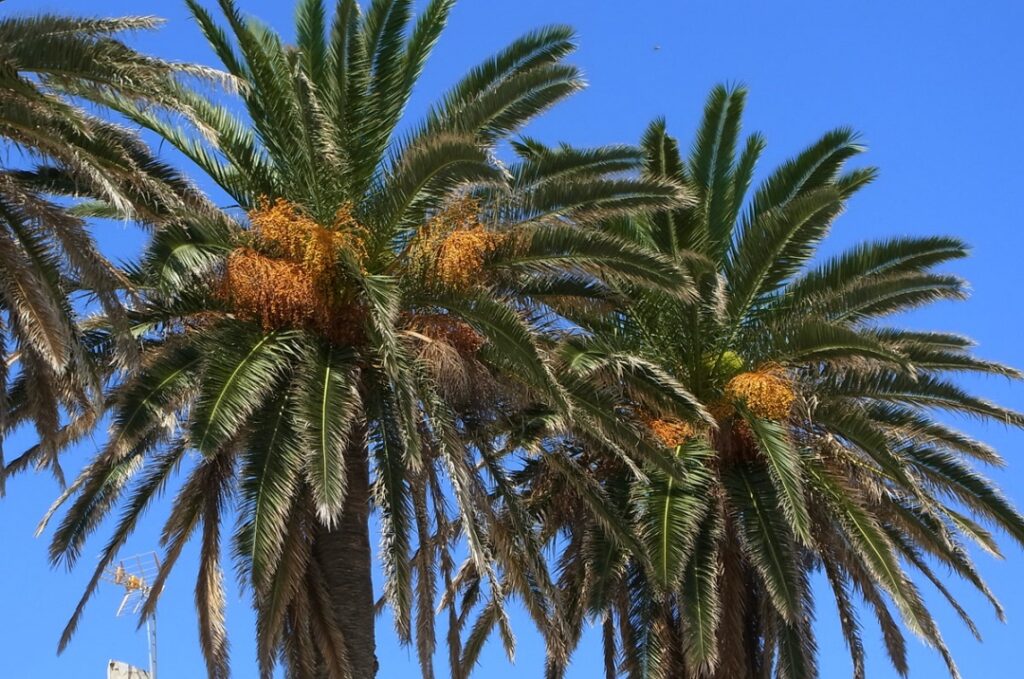
D.S, CC BY-SA 3.0
Qatar
Date Palm
Phoenix dactylifera

D.S, CC BY-SA 3.0
General Description / Cultural Significance
The date palm (Phoenix dactylifera) is the most significant tree in Qatar’s culture and diet. Often mentioned in the Qur’an, dates are served for various celebrations and occasions, such as weddings, and consumed at the beginning and end of fasting days during Ramadan. Also in the Qur’an, Maryam is instructed by Allah to eat dates when she gives birth to Isa. This symbolic act led to a cultural tradition that pregnant women fortify themselves with dates during childbirth. Studies from 2011 and 2017 verified the benefits of dates in aiding in childbirth, delivery, and recovery. At the name-giving ceremony, which takes place on the seventh day after an infant’s birth, macerated dates are often placed in the baby’s mouth. This could be due to the fruit’s rich antioxidant flavonoids, which possess anti-inflammatory, anti-hemorrhagic, and anti-cancer properties. Research has confirmed that dates are rich in microelements including potassium, phosphorous, calcium, chlorine, and magnesium, and have appreciable quantities of iron, manganese, copper, and zinc.
The date palm is one of the oldest trees in the Arabian Peninsula. Evidence of date palm cultivation dates from 4000 BC in Ur, Lower Mesopotamia (Iraq). The trees play a key role in the life of the people and are the most important agricultural crop in the country. Qatar ranks as the 16th largest date-producing country in the world and the date crop is 7.2 % of the country’s total agricultural production.
Date palm trees come in both sexes. However, it is only the female trees that bear fruit, so determining the gender of the tree is a high priority for commercial plantations. It takes six to eight years to grow the tree from a seed to the time it can be tested for its gender.
Climate Change / Conservation Status
As the date palm is a plant of high cultural status, a critical source of nutrition, and a top export product, the country is focusing on scientific research to identify the best conservation methods. This process has yielded genetic secrets, as well as achievements in crop and pest management and biodiversity conservation.
Qatar is also pioneering research and manufacturing techniques to produce new, lightweight, high-strength materials from date palm waste, such as nanocellulose. These materials have applications in cosmetics, medicine, and pharmaceuticals.
However, the peninsula is one of the fastest-warming and hottest places on Earth. As the deadly effects of global warming bear down on the region, the yields from date palm trees grow lower. The tree is still looked to for food security, to provide protection against desertification, and to shade under-crops from extreme heat, however, despite great care given to the trees, harsh climate conditions and scarce water resources make everything increasingly more dangerous. Air-conditioning is used everywhere, even outside, such as at their open-air stadium.
The country is proactive in its climate mitigation, adaptation, and decarbonization and is building massive solar plants. Besides addressing its range of problems, including behavioral and social problems, Qatar is also helping other countries combat climate change.
Sources
Al-Kuran, O., L. Al-Mehaisen, H. Bawadi, S. Beitawi, and Z. Amarin. “The effect of late pregnancy consumption of date fruit on labour and delivery.” Journal of obstetrics and gynaecology31, no. 1 (2011): 29-31.
Al-Munajjid, Shaykh Muhammad Saalih “Does Islam recommend any particular foods to maintain a woman’s good health during pregnancy?” IslamQA, 21 August 2014. https://islamqa.info/en/214222
Development of Sustainable Date Palm Production Systems in Gulf Cooperation Council Countries. International Center for Agricultural Research in the Dry Areas, (2011). “QU to utilise date palm waste to make products” The Peninsula, Qatar. 6 January 2016, http://www.thepeninsulaqatar.com/news/qatar/365122/qu-to-utilise-date-palm-waste-to-make-products
Muhammed N.H., Ahmed O.E., Ahmed T.A., Al-Yafai M.S. (2015) Date Palm Status and Perspective in Qatar. In: Al-Khayri J., Jain S., Johnson D. (eds) Date Palm Genetic Resources and Utilization. Springer, Dordrecht
Office of the Ambassador, Permanent Mission of the State of Qatar to the United Nations.
Razali, Nuguelis, Siti Hayati Mohd Nahwari, Sofiah Sulaiman, and Jamiyah Hassan. “Date fruit consumption at term: Effect on length of gestation, labour and delivery.” Journal of Obstetrics and Gynaecology 37, no. 5 (2017): 595-600.
“The Date Palm Yields Its Secrets to WCMC-Q Researchers” Qatar Foundation, 15 July 2014,
“Why dates” Date Palm Research Program, Weill Cornell Medicine – Qatar, https://qatar-weill.cornell.edu/research-labs-and-programs/date-palm-research-program/why-dates

